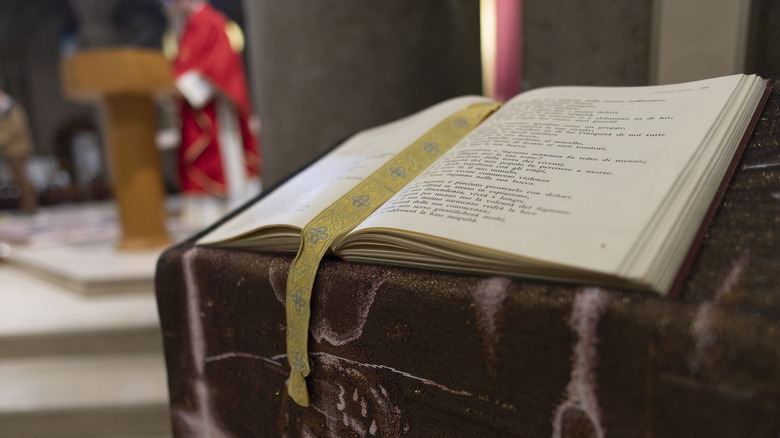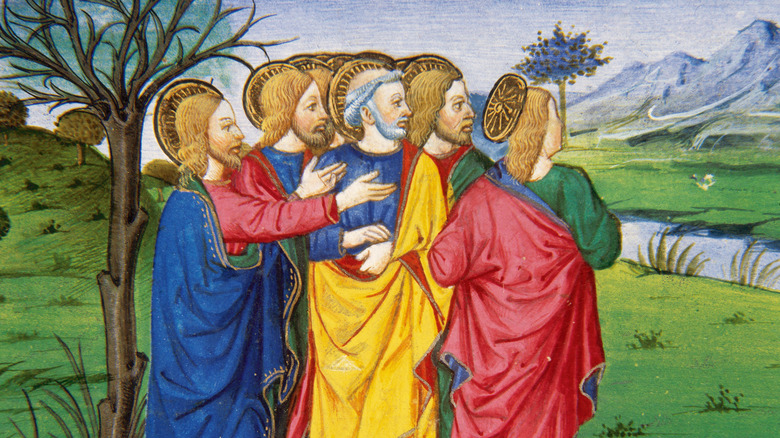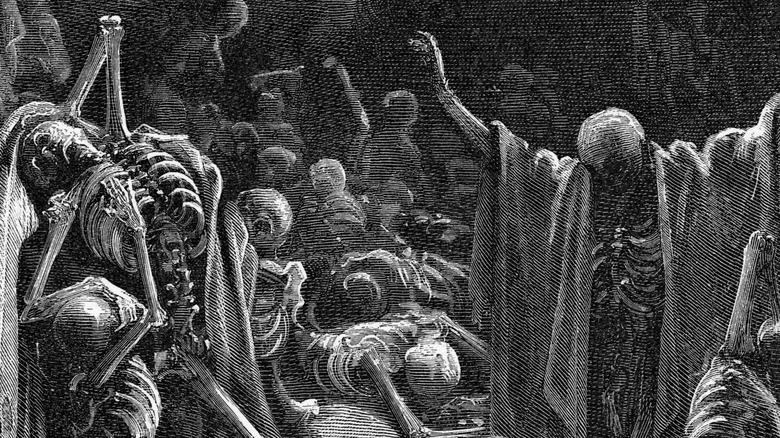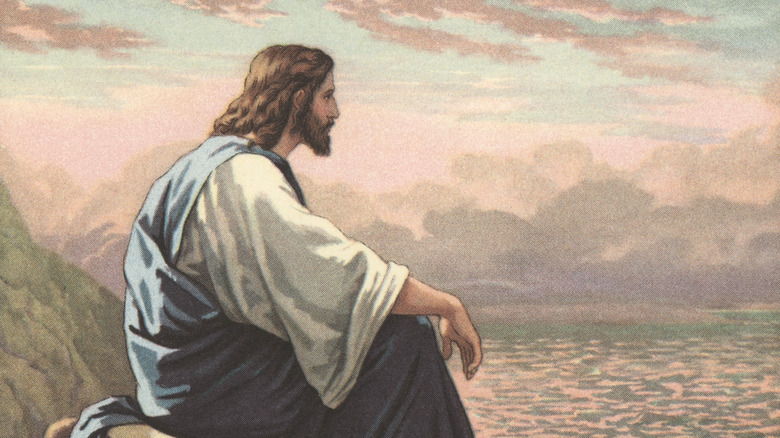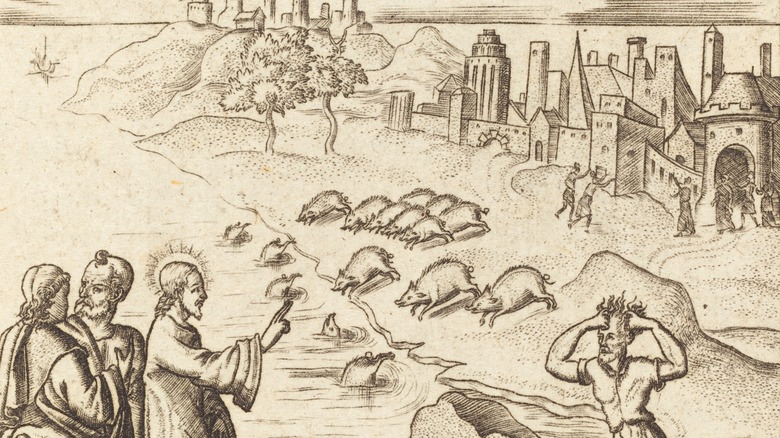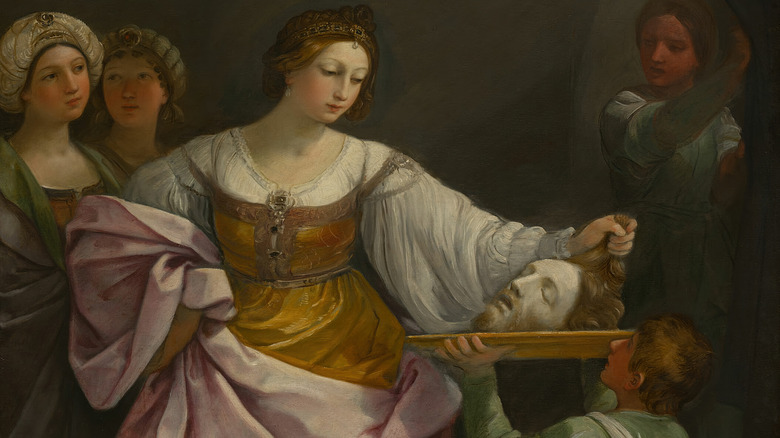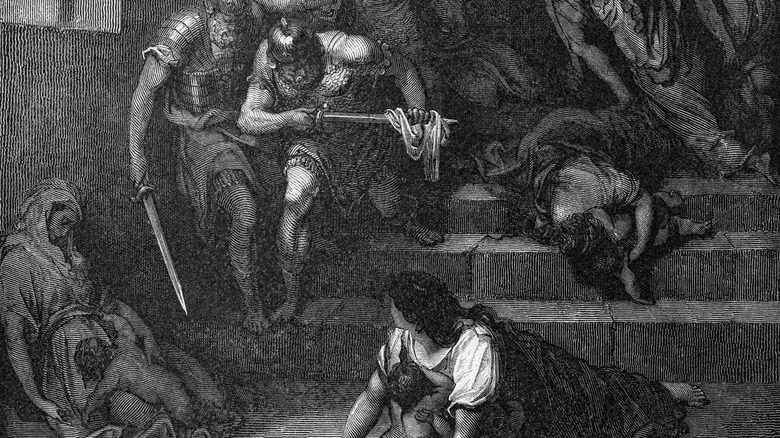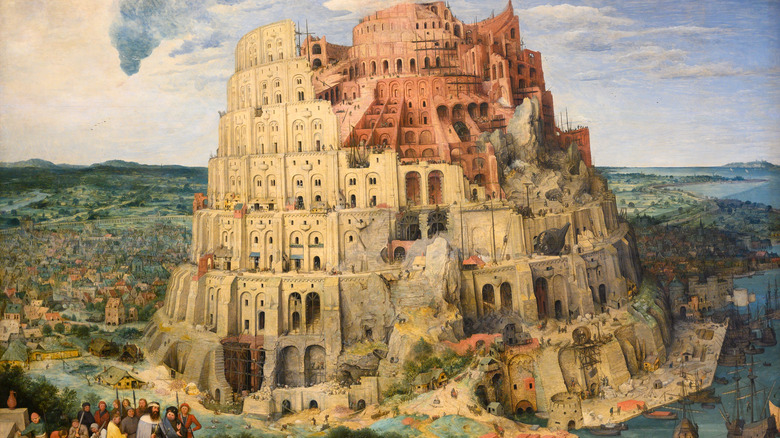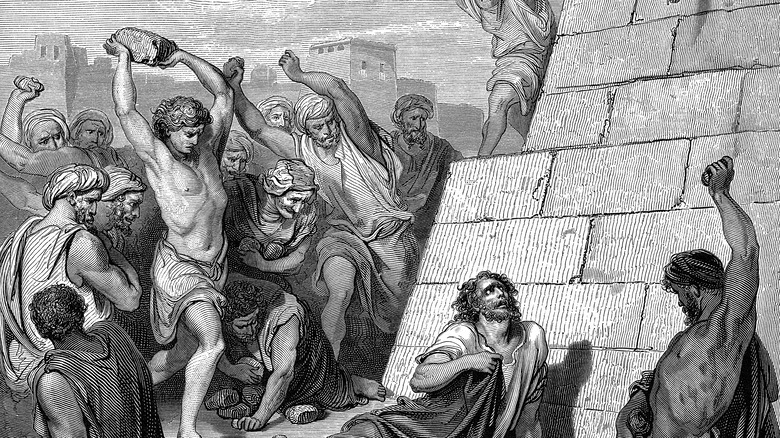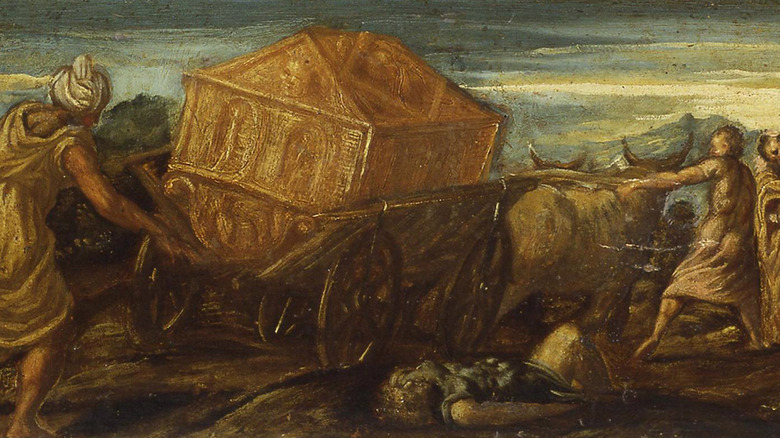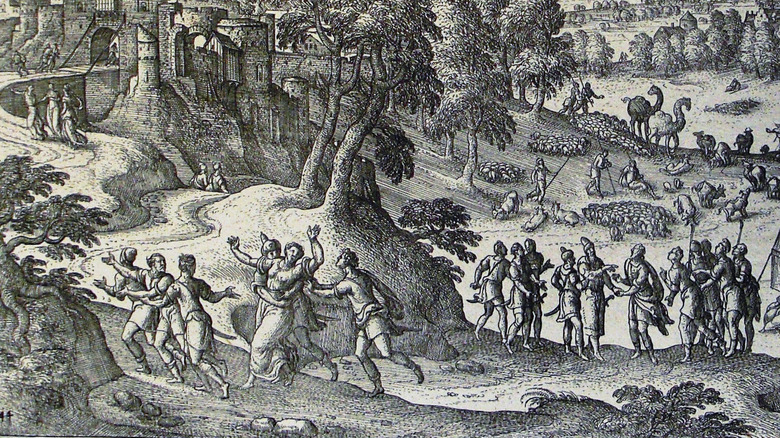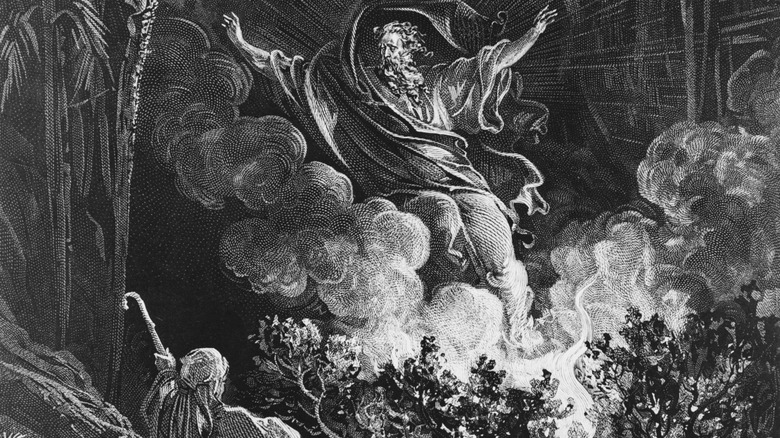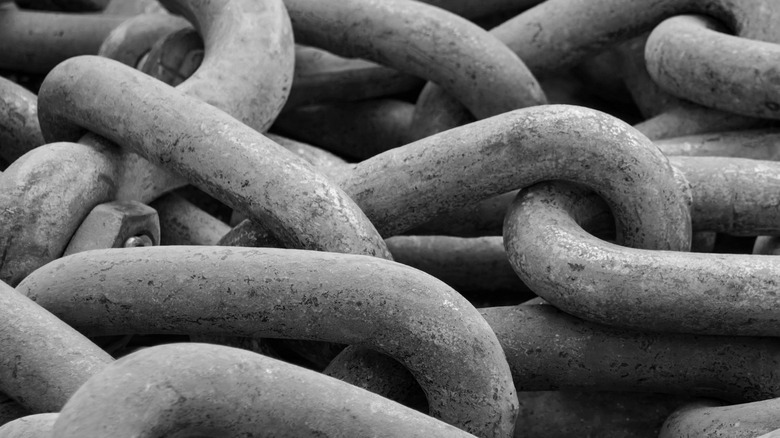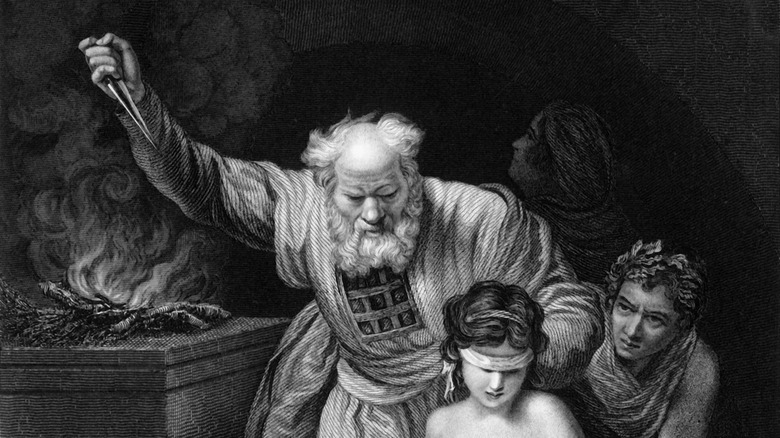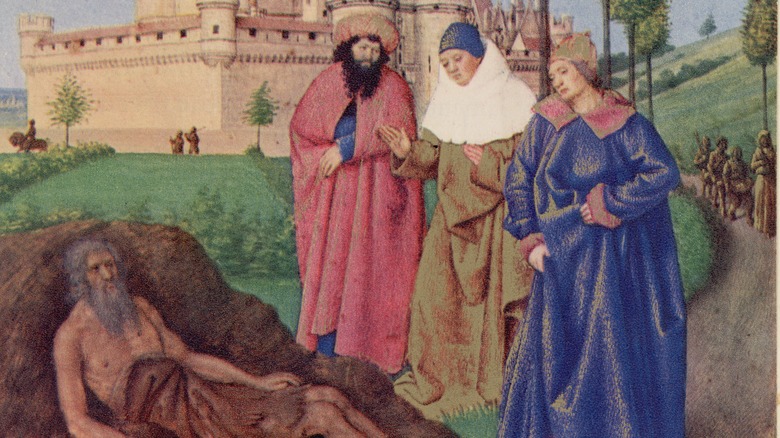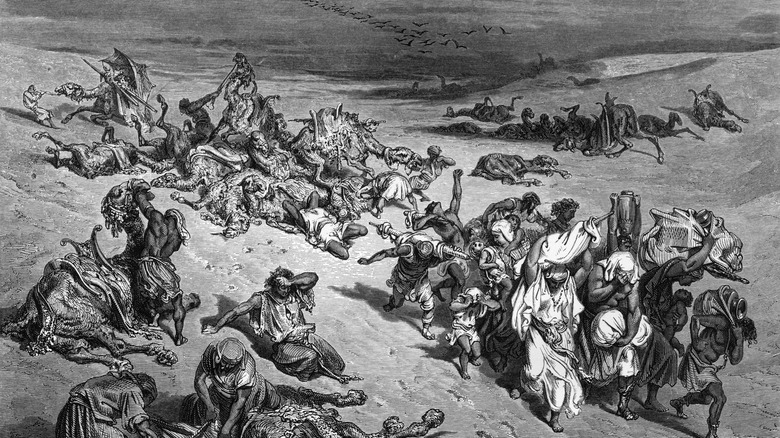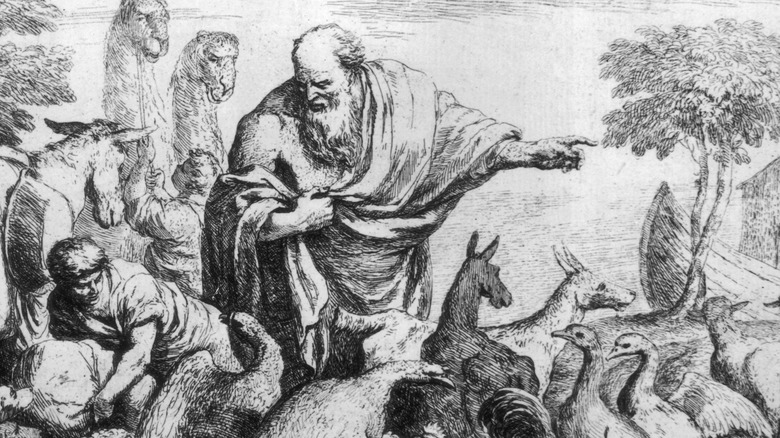The Most Disturbing Parts Of The Bible Ranked
The Bible is full of beloved stories. Passages from it are often read at weddings, stories from it are often told to children, and its themes have inspired countless modern books and movies, from "The Chronicles of Narnia" to "The Matrix." According to Mark A. Noll, writing for Houston Christian University: "The Bible has been a permanent fixture in American culture since the beginning of the European settlement of North America."
However, from animal attacks to cannibalism, many parts of the Bible would be totally inappropriate to bring up at a wedding, let alone tell to children. The following parts of the Bible seem better suited to a horror movie than a bedtime story. Some aren't particularly well-known, and others may be more familiar, but when examined more closely, they are all definitely perturbing. These are the most disturbing parts of the Bible, ranked from bad to worst.
The following article includes references to violence, incest, and sexual assault.
23. Jesus takes out his anger on a tree
In the Gospel of Mark, Jesus and his followers are walking to Jerusalem when they notice a fig tree. Jesus, being quite hungry, goes to check if it has any fruits for him to eat, but it isn't the time of year when fig trees give fruit, so all he finds on the tree are leaves. Jesus curses the tree, saying, "May no one ever eat fruit from you again." That night, he and his disciples leave Jerusalem and pass by the same tree, only to find it withered and dead — killed as a result of Christ's curse.
Exactly why Jesus would choose to kill a fig tree because it wasn't the season for figs, preventing anyone else from enjoying it in the future, is debated. Some have interpreted it as a metaphor for God's expectations. In "An Exposition of the Gospels," John MacEvilly suggests that although the tree did nothing to deserve being cursed, God requires human beings to always be equally pious and good regardless of the season, and if they let him down, they will be punished like the barren tree. Other scholars, such as the early medieval Augustine of Hippo, interpreted this story as meaning that, because Jesus killed the tree even though it had done no wrong, he must not care about plants, and therefore nature did not have any rights under God.
22. Skeletal visions
In Ezekiel, the eponymous prophet has a vision of a valley filled with dry bones. On the instructions of God, Ezekiel tells the bones to come to life. He hears a strange rattling. The bones are coming back together, building themselves into skeletons. Tendons, flesh, and skin grow on the skeletons, but they are still dead. Again, on the orders of God, Ezekiel restores the bodies to life, creating a vast army. God tells Ezekiel to tell his people, "I am going to open your graves and bring you up from them; I will bring you back to the land of Israel."
While skeletons growing flesh might seem like a scene from "Hellraiser," Ezekiel's vision is meant to uplift readers. Ezekiel's vision occurs as he and his people are exiled after the temple's destruction. According to Scriptura: "[God] put on such an unbelievably dramatic display purposefully 'to combat the despair which had settled upon the [agonizing] exiles.'"
Some interpret this story as a promise of an afterlife, but it can also be read as a call to keep faith despite being persecuted. This made the story popular with Black ministers at the end of the 19th century, and inspired the classic spiritual song "Dem Bones."
21. Hate your family and gouge out your eye
There are several examples in the New Testament of Jesus telling his disciples that they must make sacrifices to follow him and please God. Some of the sacrifices are well known, like giving up their worldly goods, but others are more disturbing.
In the Gospel of Luke, Jesus is quoted as saying that in order to follow him, they had to not only leave their family behind, but actually hate them, saying, "If anyone comes to me and does not hate his own father and mother and wife and children and brothers and sisters, yes, and even his own life, he cannot be my disciple." Some have suggested that Jesus doesn't necessarily want them to despise their own children, but does expect them to forsake them if they are holding them back from following the will of God.
Jesus doesn't just expect his followers to abandon their families, he also says that they might have to mutilate their own bodies to serve God. In the Gospel of Matthew, a literal reading of Jesus states that they cut off their hands and gouge out their own eyes, if having them is tempting them to sin: "It is better for you to lose one of the parts of your body than for your whole body to be thrown into hell."
20. Jesus kills animals
In the Gospel of Matthew, Jesus discovers two demon-possessed men who are preventing anyone from traveling through the area. When they see Jesus, their demons recognize him and make a request: If he has to force them to leave the bodies of the two people they're possessing, can he at least send them into a herd of pigs that are grazing nearby? Intriguingly, Jesus grants this request, and forces the demons out of the two men and into the herd of pigs – only to force the entire herd of pigs to run away from their swineherds and off a cliff, to drown in the lake below.
Why Jesus would choose to seemingly grant the request of the demons, only to kill an entire herd of pigs, is often debated. Some scholars throughout history have argued that because Christ causes the death of animals for no apparent reason, there is no reason for people not to do the same and treat animals of all kinds as cruelly as they want. Augustine of Hippo used the fact that the pigs were innocent as evidence that, in the eyes of God, it was fine to harm innocent animals.
19. Beheading John the Baptist
In the Gospels of Mark and Matthew, the prophet known as John the Baptist denounced Herod Antipas' marriage, because his new wife had previously married and divorced Herod's brother. Herod had John the Baptist thrown in prison, but didn't go so far as having him executed, for fear of upsetting John's many followers. However, Herod's new step-daughter, Salome, was not so timid. She danced for Herod during a festival, and he promised her any reward she would like – so she asked for the head of John the Baptist. Herod didn't want to risk political unrest by killing the popular prophet, but he felt he had to keep his word, so he had John the Baptist beheaded and the head presented to Salome on a platter.
This gory sequence of events became a favorite of artists through the ages, and is the subject of multiple famous Renaissance paintings and other works of art. It has also fascinated Christian scholars, some of whom have tried to discover what happened to John the Baptist's head after he was executed. Four different skulls are claimed to be the decapitated head of John the Baptist, but no one knows for sure where his remains are.
18. Gruesome deaths
The Bible is full of violent deaths, but the fates of two enemies of Christ -– King Herod and Judas Iscariot -– are particularly grisly. According to Journal of Infection: "[King Herod] is famed in Roman history as a great builder and a diplomat, whilst in the Bible he is portrayed as the deceiver of the Magi and a genocidal maniac." This assessment of his depiction in the Bible is mostly due to the story in which Herod had all infants executed, in the hopes that he would also kill the baby Jesus. In Acts, an angel smites King Herod in a particularly gruesome way: he is devoured by worms.
Judas Iscariot — the guy who betrayed Jesus and gave his name to a common term for traitor — perished in no less than three different ways, depending on which Christian text is read (Matthew 27:5, Acts 1:18, and fragments of Papias). The version in Acts is the most brutal -– he falls, his body literally explodes, and his guts go flying everywhere.
17. Punishing the wrong person
The Bible relates countless examples of punishments for people who go against God's commandments, but some people are even punished for other people's sins. The story of Bathsheba (told in Samuel and Kings) is full of disturbing events, but the worst may be who ends up being punished by God because of them.
Bathsheba is described as being married to a man named Uriah. However, King David became infatuated with her after spying on her when she was taking a bath, and ordered her brought to him. Exactly what happened next and how consensual it was is ambiguous, but nine months later, she gave birth to King David's child. Meanwhile, King David had Bathsheba's husband, Uriah, moved to the front lines before a deadly battle, where he was killed. With Bathsheba now widowed, he could marry her instead. In punishment for having sex with the married Bathsheba and killing Uriah, God killed Bathsheba and King David's child. King David does not seem to have ever been punished for these sins himself.
16. Division
The Tower of Babel is a just-so story, explaining why people speak different languages. In Genesis, everyone speaks the same language, and because they can communicate, they are able to cooperate. The people of the world come together to build a massive city, with a tower so tall it reaches the heavens. When God sees the tower, he is disturbed by how much humans can accomplish by working together. God decides to scatter humans across the Earth, and "confuse their language, that they may not understand one another's speech," so that people would never be able to work together again.
The most common interpretation of the story is that God is punishing humankind for its pride. However, some people choose not to read the story as being about the origin of languages or God trying to prevent collaboration. Instead, they explain God's behavior in this part of Genesis as being a criticism of empire-building imperialism. As the Journal of Biblical Literature notes: "The emphasis on one language at the beginning of the story represents the imperial suppression of local languages and cultures, and God's punishment brings down the empire ... setting free the local languages and cultures to flourish."
15. Casting stones
There are many cruel and unusual methods of execution in the Bible, though some are more common than others, such as beheading. One of them, stoning, refers to a group of people throwing rocks at a condemned person until they are killed. Sometimes the condemned person would be naked, which would allow the blows to kill them more quickly. While the Bible does include provisions for humane forms of execution, this method seems particularly excruciating and humiliating.
In Deuteronomy, some situations are outlined that would merit someone being stoned to death. Deuteronomy states that if there is "a stubborn and rebellious son ... all the men of this city shall stone him to death," and a later passage in the book states that if a man believes his wife was not a virgin when they married, and her father cannot provide proof of her virginity, then the same awful fate shall befall them.
14. Bystanders near The Ark of the Covenant
As described in the Old Testament, The Ark of the Covenant is a golden chest containing sacred stone tablets, upon which are inscribed the ten commandments that God gave to Moses. In Samuel, as the Ark is being transported, the holy object causes seemingly indiscriminate devastation everywhere it goes. In one instance, the Ark of the Covenant is seen by 70 people as it is moved through a city, and God kills them all.
While this apparently random violence is shocking, the most controversial death occurs later on. The Ark of the Covenant is being transported on an ox cart, one of the oxen stumbles, and the Ark almost falls out. When a man named Uzzah catches it to keep it from hitting the road, God immediately kills him.
As noted in Water C. Kaiser's "Hard Sayings of the Old Testament," the fact that God killed someone for preventing a sacred object from breaking strikes most readers as wildly unfair, even after the 70 deaths earlier in the Ark's journey. There is no evidence that Uzzah was doing anything other than help protect an object important to God. According to Kaiser, however, God had previously warned that anyone who touched a holy object would die, and even though Uzzah was trying to do the right thing, there can be no exceptions when it comes to God's threats.
13. The rape of Dinah
There are a disturbing amount of stories featuring rape in the Bible, but one of the most controversial is the rape of Dinah. Indeed, he story of Dinah has been a popular topic for feminist biblical scholars since the 1970s.
In Genesis, a woman named Dinah is raped by a prince. After the attack, the prince asks his father, King Hamor, to help him make Dinah his wife. Hamor agrees, and goes to Dinah's father to ask him if his son can marry Dinah. Her father knew that the prince had raped his daughter, so he came up with a plan for revenge.
He told the king that no dowry was required for his daughter's hand, but could only accept King Hamor's proposal if he, his son the prince, and all the other men who followed them were circumcised. The prince was obsessed with Dinah, and so they agreed that they would force everyone to be circumcised. After the wedding, however, Dinah's family killed King Hamor and the prince. Afterward, Dinah's father and brothers destroyed the entire city where Hamor had ruled, killed the men, and enslaved the women and children.
[Featured image by Phillip Medhurst via Wikimedia Commons | Cropped and scaled | CC BY-SA 3.0]
12. Killing nonbelievers
With the amount of warfare featured in the Bible, it's unsurprising that at some points God appears to endorse violence. Some passages are more explicit than others, but one in Deuteronomy is among the most disturbing, which states that if anyone encourages worshiping a different god, they should be immediately put to death. It specifically states that there can be no exceptions, even if the person who is trying to convince you to practice another religion is your friend, brother, wife, or child – they should be killed.
This advice is seemingly put into practice in Numbers, where God commands Moses to destroy an entire kingdom that does not follow their faith. Moses sends an army of 12,000 men, who initially kill all of the men in the kingdom and capture the women and children, but this enrages Moses. He commands them to kill all of the prisoners, leaving alive and enslaving only virgin women and girls.
11. Enslavement
In modern times, the enslavement of human beings is considered to be abhorrent in every conceivable way, but not so much in the Old Testament. Exodus 20-21, which contains familiar Ten Commandments rules such as "Thou shalt not kill" and "Thou shalt not steal," also has rules about buying and selling human beings, as well as how their enslavers should treat them. One line states that if a "servant" dies while being beaten by their enslaver, then the latter "shall be surely punished." However, if the victim survives for a couple of days after the beating, there will be no punishment.
This representation of enslavement in the Bible has been used to justify it throughout history, even as the modern age dawned. According to Larry R. Morrison's paper in The Journal of Religious Thought: "The emphasis from proslavery defenders was always upon a literal reading of the Bible which represented the mind and will of God himself. Slavery was not only justified but also moral because it was recognized as such in the Holy Scripture."
10. Misogyny
In Leviticus 12, if a woman gives birth to a son, God tells Moses: "[She] will be ceremonially unclean for seven days, just as she is unclean during her monthly period." It also states that purification will take 33 days, but if the baby is a girl, that takes twice as long. Furthermore, the new mother must also bring sacrificial animals to her priest, to be offered up as burnt offerings and to atone for her sins. Deuteronomy is even harsher, stating that if a woman is a virgin, and a man sexually assaults her, he must pay her father a fine. Then the woman and her rapist must get married, and they can never get divorced.
Some have attempted to read these rules in a way that is less harsh towards women, such as the interpretation shared by Women in the Scriptures, which explains: "... when she was pregnant she was filled with potential life and the spiritual power of creation. When her child is born that spiritual power departs and she becomes tuma [unclean]. In addition by bringing a new child into the world she has also brought more death, because each child who lives must also one day die."
Others have pointed out that although these rules are in the Old Testament, Jesus is not depicted as following them in the New Testament. Indeed, Jesus repeatedly ignored or dismissed those restrictions, in favor of helping women.
9. Human sacrifice
While human sacrifice would be considered an abomination by Biblical rules, the Bible does include stories of people planning to sacrifice human beings — including their own children. Many are familiar with the story in Genesis where Abraham is told to sacrifice his only son to God as a test of his loyalty, only to be stopped at the last second by an angel. Jephthah, the ancient Israelite judge and warrior, was not so lucky.
In Judges, Jephthah swears to God that if he is victorious in his upcoming battle, he will make a burnt offering sacrifice of "whatever comes out of the door" of his home when he returns. In a chilling twist, when Jephthah returned, it was his young daughter who came out of the house to greet him. He then carried out his vow — although Judges does not explicitly state how, which has left his daughter's fate an open question for biblical scholars.
8. Killer bears
There are many more risks to children in the Bible than being sacrificed. In Kings, the prophet Elisha is walking on a road when a group of little children starts mocking him for being bald. Elisha then curses them, and immediately two bears run out of the woods and maul 42 of the children to death.
The most common interpretation of this story is that everyone should respect authority, because God won't tolerate anyone, even small children, making fun of his representatives. However, some modern Christians argue that "little children" was actually a mistranslation, and it is actually supposed to be 42 male servants who were killed by bears. They also argue that the reason that they were killed wasn't as seemingly petty as it appears, and that rather than Elisha being offended by taunts about hair loss, the bears were called to kill the group because they worshipped different gods.
7. Testing loyalty
The Book of Job addresses the question of why bad things happen to good people. In Job's case, it's because of a bet.
Job is a pious man. Even God himself says: "There is no man on earth as blameless and upright as he." However, Satan suggests to God that Job is only so loyal because he has "God's blessing," and has a wonderful life. God accepts Satan's challenge and decides to test Job's loyalty by taking away everything he has.
God kills Job's children and destroys his home. Job continues to praise God. Then God has the Devil give Job a horrific skin condition. His friends believe he must have sinned, or God wouldn't have punished him, because "the just man is rewarded, the sinner punished." Job, on the other hand, argues that he isn't being punished, instead it's just that "God wants to torment him, without reason. God is cruel." God tells Job that he is all-knowing and Job is not, saying, "You know little of the world and can do less about it." Ultimately, God gives Job everything he had before and more (although some critics argue that the chapters detailing Job's restoration are not from the original book.)
6. Plagues of Egypt
Famously, in chapters 7-12 of the Book of Exodus, God sends a series of 10 plagues to force the Egyptian pharaoh to release the Hebrews he had enslaved. First, the Nile River turns into blood. Then, all of Egypt is covered in frogs, which hop into people's beds and get into the cooking, and swarms of bugs which cover everything and eat all the crops, causing famine. Next, a gruesome skin disease causes the people and animals of Egypt to break out in boils. Terrible storms kill anyone caught in them, and the sun vanishes for three days, throwing the entire kingdom into darkness. Finally, the oldest boy in every family is killed by God in one terrible night.
These plagues are certainly disturbing enough on their own, but even more distressing is the fact that God seems to have wanted these catastrophic events to happen. Although the plagues seem to be a punishment for the Pharaoh refusing to free the enslaved Hebrews, it seems that God is the one who made him refuse. As Exodus tell us, before Moses asks for his people to be freed, God tells him: "I will harden [the Pharaoh's] heart so that he will not let the people go."
5. Murder and dismemberment
The story of the Levite and the concubine is a brutal one. According to Women in Judaism, the young woman called a concubine was likely the Levite's second wife. The two are traveling, and looking for a place to spend the night. They are invited to spend the night in someone's house, but ominously warned not to by an old man they meet.
That night, "the men of the city, a perverse lot, surrounded the house." This group demands that the group's host send the Levite out so they can have their way with him. To save himself, the Levite forces the concubine out to the mob. She does not survive the night. The next morning, the Levite discovers the concubine's body outside the door to the house. He brought the body back home with him, dismembered the corpse into 12 pieces, and sent each part to a tribe of Israel, as a "cry for vengeance."
This story might seem uniquely horrific, but there is another story that begins almost exactly the same way, with a violent mob surrounding the house, only to be offered a sacrifice: That of Lot.
4. Sexual violence and incest
The story of Lot and his daughters in Genesis has a similar premise to the story of the Levite and the concubine, but ends very differently. Two angels come to Sodom, planning to spend the night in the town square, but Lot urges them not to. Instead, the two angels stay with Lot's family. That night, every single man in Sodom surrounds the house and demands that Lot send the two angels out.
Lot makes the mob a horrific offer: "I beg you, my brothers, do not act so wickedly. Behold, I have two daughters who have not known any man. Let me bring them out to you, and do to them as you please." The mob refuses. The city of Sodom is going to be destroyed by God, so Lot and his family make their escape, but Lot's wife is turned into a pillar of salt for looking back at the burning city. This leaves Lot alone with the two virgin daughters he tried to sacrifice.
Lot and his daughters go into hiding, and the two young women worry that they will never have children since they aren't able to meet any men. As described in Folklore, the two decide to "make our father drink wine and then lie with him, and this way keep the family alive." Their plan works: Both daughters become pregnant by their own father.
3. Cannibalism and infant death
There are many forms of violence against infants in the Bible, but one of the most horrific incidents takes place in Kings. The king is asked to rule on a particularly horrific case. The kingdom is going through a terrible famine, and when a woman asks for an audience, the king assumes she is there to ask for food. The truth is much more sinister.
The woman is there to ask for help because her friend didn't go through with her side of the deal. When all of the food ran out, the two women made a bargain: that they would kill and eat their own infant children. "This woman said to me, 'Give your son, that we may eat him today, and we will eat my son tomorrow.' So we boiled my son and ate him. And on the next day I said to her, 'Give your son, that we may eat him.' But she has hidden her son." The woman seems to hope that the king will force her friend to give up her child, but all he does is tear at his clothes.
2. Almost everything in Revelation
The final book of the New Testament is Revelation to John, which floridly describes the end of the world. Despite how widely known parts of the book are, the sheer scale of horror and death is still shocking to modern readers. As described in 1999 by professor of religious studies, James Tabor, for PBS, "Someone once tallied up the death count and projected it on a modern world such as ours, with five billion people, and it's absolutely a horrible kind of a statistic. You come up with maybe four billion dying of famine, war, earthquake, plagues." That's a fatality rate of four out of every five people in existence, which as of late 2023, would be well over six billion horrifying deaths.
There are many terrifying enemies of humankind in Revelation, including "The Beast," also known as the Antichrist, and Satan himself. But in Revelation, these monsters are only sidekicks to the one actually destroying the world and killing billions of people: God.
God's wrath turns the oceans to blood, splits apart the land, and blots out the sun. It is his storms and diseases that kill everyone, and when Jesus Christ finally appears, it isn't to save humanity. Rather than preaching peace as Jesus often does in the rest of the New Testament, he arrives as a conqueror, seizing control of the last bastions of civilization by force. As stated in Revelation 2:27, "he will rule them with a staff of iron and dash them to pieces like pottery."
1. Genocide (and incest again)
Noah's Arc is probably one of the best-known Bible stories. This is partially because all the animals in the story make it appealing to children. In fact, it is often considered a good bedtime story. However, when examined, the story is anything but kid-friendly.
In Genesis, God intends to destroy all life on Earth because he feels that they have sinned. But one family and a floating zoo are spared. God warns Noah of the flood, so they will have enough time to build a boat large enough for him, his wife, and his three sons and their wives –- as well as two of each kind of animal.
God sends the flood, and it kills every single living being on the planet. The only survivors are those on the ark. They are left to repopulate the earth — in fact, they are specifically told by God to do so in Genesis 9:7, when God instructs: "As for you, be fruitful and increase in number; multiply on the earth and increase upon it." However, because there was only one pair of each animal and eight humans on the arc, this means that all the animals on the planet would be from only two animals, and every human would be incestuously descended from Noah's children.
